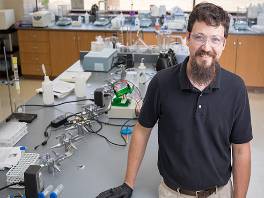Fighting the Fight
UT Tyler’s Dr. Dustin Patterson Battles Cancer Through Novel Research
 Growing up on a farm in Northwest Ohio, Dr. Dustin Patterson helped his family grow
soybeans, corn and wheat. As a side hobby, he also helped his father breed and show
pigs competitively. His interest in science and genetics – specifically, understanding
the chemical processes that controlled genetics – led him to chemistry, and in turn,
academia.
Growing up on a farm in Northwest Ohio, Dr. Dustin Patterson helped his family grow
soybeans, corn and wheat. As a side hobby, he also helped his father breed and show
pigs competitively. His interest in science and genetics – specifically, understanding
the chemical processes that controlled genetics – led him to chemistry, and in turn,
academia.
As a professor in the College of Arts and Sciences Department of Chemistry and Biochemistry, Patterson enjoys teaching undergraduate students at UT Tyler, where he has served since August 2014.
He believes teaching students and watching them contribute to science with their careers is a major contribution in itself. To date he has mentored more than 20 students who have gone on to successful careers in academia, healthcare and the private sector.
“I enjoy the opportunity to teach them, to laugh with them, and to see them grow and develop as independent thinkers,” said Patterson, an associate professor of biochemistry. “The CAS is great, and the faculty genuinely care about their discipline and their teaching. It is a pleasure to be counted in their number and work alongside them.”
At the University, Patterson is conducting novel research in the fight against cancer. His research focuses on the development of biomaterials, with a main focus on the manipulation and the re-engineering of virus-like particles (VLPs). Current research looks at understanding the mechanisms that lead to cancer cachexia and developing strategies for its prevention.
Cancer cachexia is a syndrome that leads to loss of body mass and muscle. This has an adverse effect on cancer patients’ ability to fight infection and withstand treatment with chemotherapy and radiotherapy, Patterson said. Cancer cachexia occurs in up to 80 percent of cancer and is responsible for 20 to 40 percent of cancer related deaths, and is therefore a major concern in improving the clinical outcomes and care for cancer patients, according to the professor.
Patterson is collaborating with colleagues at the University of Arkansas, Baylor University and University of Georgia to develop a drug delivery system targeting cancer cells and eliminate such drastic side effects. Earlier this year, the team received a five-year $1.6 million grant from the National Institute of Health to further their research. Patterson was brought on board to see if he could target VLPs to muscle as a delivery vehicle for therapeutics.
“Some preliminary studies with a rat model showed localization of the VLPs that were constructed in my lab at the muscle tissue, with no residual uptake in other cells, which supported our position that this could be a potentially viable approach for the delivery of therapeutics,” Patterson said, noting that the ultimate goal is to improve health outcomes for cancer patients.
Patterson added that VLP technology is still a developing field and there is still significant work to be done to show that it is a viable platform for drug delivery.
The next goal for the team is to complete cell-based studies to better understand trafficking and entry of VLPs into cells, which will help shape their strategy for drug release.
“In addition, we are developing new chemical strategies for packing the interior space of the VLP full of drugs to enable lower dose requirements in treatment strategies,” he said.
The colleagues with whom he has the privilege to work regularly is one of the reasons Patterson enjoys working at UT Tyler. He also actively collaborates with UT Tyler faculty from chemistry, biology and pharmacy and said he enjoys combining the research expertise they all have to tackle research problems and topics together.
“I work with some of the nicest and most caring individuals, both within my department and across the campus, and I really appreciate the care that the faculty here have for their students and for each other,” Patterson said. “I have been impressed and appreciative with how open people are to collaborate with me on projects that are interdisciplinary.”
His curiosity in COVID-19 and other enveloped viruses has steered a new research endeavor for the professor, who will begin studying how creating a VLP system against coronavirus-type pathogens will help aid in vaccine development.
“Currently the VLPs I work with are completely protein based, but enveloped viruses also contain a lipid, i.e. fat, component that makes up the structure,” he said. “By developing an enveloped system, I could use it to more closely mimic the corona viruses, which would be useful in vaccine development.”
Patterson advises UT Tyler students to seize every opportunity they have to learn something new.
“Embrace the fact that learning doesn't end with a course or college degree–learning is a lifelong process,” he said.
A self-proclaimed “family man,” Patterson enjoys spending time with his wife and their four children when he’s not teaching or conducting research. He also enjoys playing basketball and continues helping his father produce quality show pigs for competition.
#CAS




